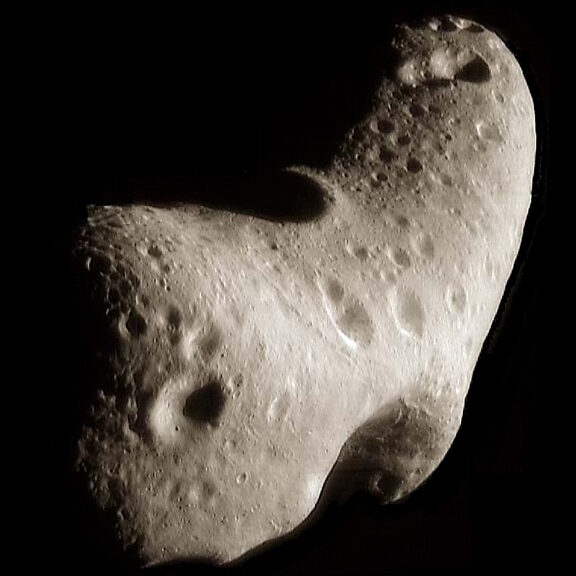All
All
Stories, updates, insights, and original analysis from The Planetary Society.
LPSC 2011: Kirby Runyon on Mars, the Moon, Hartley 2, and Ganymede
Kirby Runyon, a second-year grad student at Temple University, offered to send me some writeups of selected presentations from last week's Lunar and Planetary Science Conference, and I enthusiastically agreed.
LPSC 2011: Wanted: Pioneer 10 & 11 digital data
This is both a Lunar and Planetary Science Conference (LPSC) update and a public service announcement. Ted Stryk has been working for years to locate the original Pioneer 10 and 11 image data from the Jupiter and Saturn encounters.
LPSC 2011: Day 3: Deep Impact at Hartley 2
Wednesday's sessions at the Lunar and Planetary Science Conference (LPSC) on the Deep Impact flyby of Hartley 2 were one of two that I was most looking forward to, the other being this morning's talks on Hayabusa's samples from Itokawa, about which I don't yet have any notes. I am again grateful to Franck Marchis and Andy Rivkin for sending me their notes on Hartley 2.
LPSC 2011: Day 3: Moon, Mars, and Venus
Wednesday morning included some interesting conversations. Notably, I spoke with Pamela Gay, who is responsible for the MoonZoo citizen science program and who is presently working on developing a site through which the public will be able to help search for potential Kuiper belt objects for the New Horizons mission to encounter after the Pluto flyby.
LPSC 2011: Day 1: Small bodies
Here are some of the noteworthy items from the morning's session on
The 42nd Lunar and Planetary Science Conference (LPSC)
Science is all about asking questions, coming up with ideas that might explain the answers, and then poking at those ideas to see if they work. Scientists spend much of their time in solitary research working out those ideas. But they also devote big chunks of time to meetings where they pitch their ideas and see what their peers think of them.
Talk at AGU today: "Snapshots from Space"
I had planned to be in San Francisco today to present at the 2010 Fall Meeting of the American Geophysical Union, in an Education and Public Affairs session.
365 Days of Astronomy Podcast: What's in a Science Meeting?
Today the 365 Days of Astronomy podcast aired my contribution, What's in a Science Meeting?, about what scientists do at big meetings like the Division of Planetary Sciences.
DPS 2010: Centaurs and Trans-Neptunian objects
I attended all day Tuesday of the Division of Planetary Sciences meeting on October 5. The afternoon session on Tuesday was a grab bag about different small objects in the outermost solar system.
Rover news; Earth-size exoplanets; Future of Russian space
Just a linky post here.
In which I report on w00tstock and wonder how to get nerds more excited about real space exploration
(I promise that this post will get around to the subject of space exploration in a couple of paragraphs.)
Timeline for the Phobos Sample Return Mission (Phobos Grunt)
In mid-October, I attended the First Moscow Solar System Symposium. Its focus was mostly on Phobos science and plans for next year's launch of the Phobos Sample Return Mission (also known as Phobos-Grunt), on which The Planetary Society will be flying the Living Interplanetary Flight Experiment.
DPS 2010: Pluto and Charon opposition surges, Nix and Hydra masses, Pluto and Eris compositions
An awful lot of the talks in the Pluto session on Tuesday morning, October 5, at the Division of Planetary Sciences meeting spent more time focusing on how bad weather conditions were during the astronomers' attempts to view Pluto as it occulted background stars than they did on any measurements or science that came out from the data.
The 4th MSL Landing Site Workshop: Day 3 - Final Discussion
We wrapped up the landing site workshop on Wednesday afternoon by revisiting each of the four sites and discussing them in turn. Unfortunately, the way that we did this was very disappointing, and made for a frustrating afternoon.
The 4th MSL Landing Site Workshop: Day 3 - Engineering and Safety
With the details of all four landing sites on the table, we started day 3 of the meeting by hearing from the engineers and several scientists about the properties of the ellipses, the risks for landing and the capabilities of the landing system.
Fourth MSL Landing Site Workshop: Day 2: Reports from Ryan Anderson
I left the first day of the Fourth Mars Science Laboratory Landing Site Community Workshop on Monday just as they were getting in to the site-specific presentations. I left with no concern that I'd miss anything, though, because I knew that once he got done presenting his own work on Gale Crater, Cornell grad student Ryan Anderson would be taking notes and blogging the presentations on the other three sites.
Bill Nye Connects with Space People at IAC
The 61st International Astronautical Congress (IAC) is being held in Prague in the Czech Republic, and Bill Nye is attending on behalf of the Planetary Society.
The 4th MSL Landing Site Workshop: Day 2 - Mawrth
Today was jam-packed with interesting stuff about Mawrth, Holden, and Eberswalde! I took tons of notes, and I will try to use those to assemble a coherent picture of what was presented and discussed today.
The 4th MSL Landing Site Workshop: Day 2 - Holden
The second site that we discussed yesterday was Holden Crater, a 155 kilometer crater that formed right in the middle of a huge drainage system.
The 4th MSL Landing Site Workshop: Day 2 - Eberswalde
The final site of the four that we discussed yesterday was Eberswalde, which of course is interesting because of the big delta that is preserved in the western part of the crater.


 Explore Worlds
Explore Worlds Find Life
Find Life Defend Earth
Defend Earth


 Sun
Sun Mercury
Mercury Venus
Venus Earth
Earth Mars
Mars Jupiter
Jupiter Saturn
Saturn Uranus
Uranus Neptune
Neptune Small Bodies
Small Bodies

















